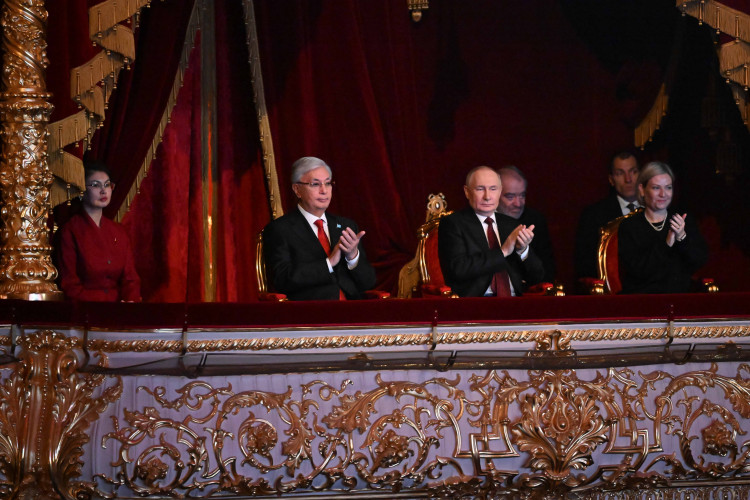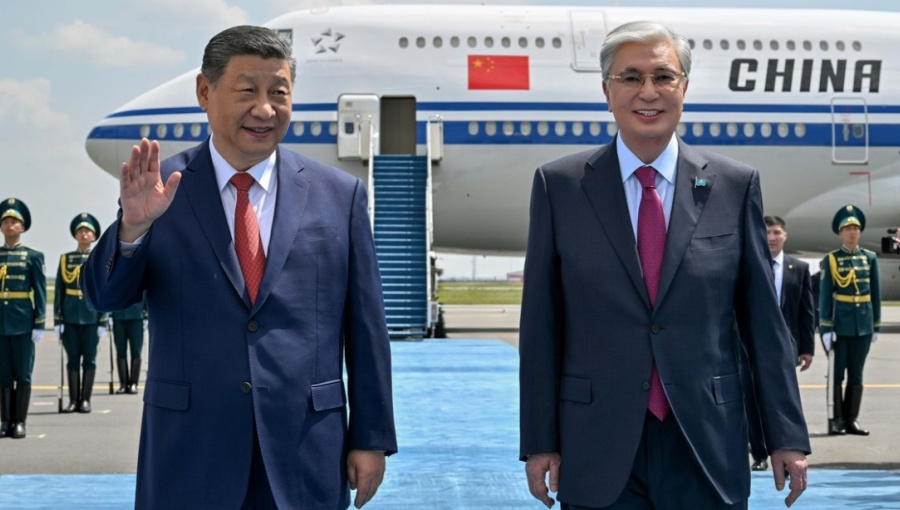COMMENT: Trump was “sent by heaven”, Russia is a “God-given” neighbour, says Kazakhstan’s president. What's cooking?

In hindsight, will it go down as a dud, a wet squib? For a day last week, the big Donald Trump-Central Asia summit consumed the agenda at the White House. Numerous memoranda that could deliver a great quantity of trade and investment deals were signed and America’s loquacious president declared that US, Central Asia relations will be strengthened “like never before”.
The cameras were packed up, the sound was turned down and the sober reflection began.
Temur Umarov, a fellow at the Carnegie Russia Eurasia Center, comes across as a sceptical analyst who is hedging his bets.
In a November 11 essay examining the outcome of the “C5+1” summit, attended by all five of Central Asia’s presidents, Umarov concludes: “Central Asia’s rapprochement with the United States has every chance of remaining at the level of empty promises and utopian projects with impressive-sounding figures. But it could also force the region to face a difficult choice between incurring the wrath of its traditional allies Russia and China or disappointing Trump and becoming even more dependent on Moscow and Beijing.
“For now, however, the region is unlikely to be concerned about this. The current task for Central Asia’s leaders is to squeeze as much capital as possible—even if it’s only symbolic—out of Trump’s interest. By the time they need to demonstrate practical success, there may already be someone else in the White House.”
Very notably, just six days after the Washington, DC summit, Kazakh President Kassym-Jomart Tokayev was sat on the balcony of the Bolshoi Theatre in Moscow with Russian leader Vladimir Putin, who ostentatiously spent many hours with Tokayev, hosting him on a state visit.

The state visit to Russia of Tokayev (left centre) included a trip to Moscow's Bolshoi Theatre with Putin (Credit: Akorda.kz).
The Kremlin was suitably scathing in its assessment of Trump’s wooing of Central Asia, a traditional post-Soviet ally. The messaging was not subtle. Putin’s spokesman Dmitry Peskov was asked to respond to the gushing praise Tokayev delivered to Trump’s face. That praise included a moment on camera at a working dinner when even Trump’s eyebrows may have felt some uplift as Tokayev told him: "You are a great leader, a statesman sent by heaven to bring common sense and traditions that we all share and value."
Peskov wryly dismissed Tokayev’s remarks as “nothing unusual” and part of some form of standard procedure for an official visit to the US. “A great many people who end up visiting the White House start talking like that,” quipped Peskov.
Still, as suggested by Umarov: “Never before has the United States been so successful in its attempts to convince Central Asia that cooperation with Washington is worth the inevitable irritation it will elicit from the region’s two powerful neighbors, China and Russia.”
Whether the new approach will bear fruit remains to be seen, says Umarov in his analysis, while observing: “Attention from Washington has always been a valuable asset for the governments of post-Soviet countries. It lends them additional weight on the international stage, while at home it underscores who’s in charge. This is particularly important for the countries of Central Asia, where the United States is the only power that Russia and China are willing to take seriously, unlike the EU, Turkey, or any other middle power.
“Accordingly, Central Asia has always been willing to adapt to the U.S. ideological agenda, even when Washington’s talk of promoting democracy could not have been further from the real priorities of Central Asia’s rulers. And when Trump himself began to crush organizations like the U.S. Agency for International Development, the National Endowment for Democracy, and Radio Free Europe/Radio Liberty that had long irritated the region’s ruling regimes, that automatically guaranteed him their ardent support.
“Neither the U.S. president’s extremely hazy knowledge of the region nor the additional tariffs he imposed (25 percent for Kazakhstan, 10 percent for the rest) could alienate Central Asia’s leaders after that. On the contrary, the region’s presidents became even more active in adapting to Washington’s new agenda, publicly criticizing NGOs and the fight against climate change.”
As Tokayev flew into Russia for his state visit, two Su-35 fighter jets escorted his plane through Russian airspace. The Kazakh leader had, meanwhile, smoothed his arrival in Moscow by writing an article published to coincide with his visit by Russian newspaper Rossiyskaya Gazeta and headlined, "Eternal Friendship – A Guiding Star for Our Peoples."
In the article, Tokayev described how he had held talks with the leaders of China, the US, European and other Asian countries. He wrote: "Despite the fact that many of them are at opposite ends of the geopolitical spectrum, they all recognise the exceptional role of Russia and its leader in resolving key issues in international relations. In other words, it is impossible to overcome the contradictions of the modern world without Moscow's participation."
The Russians are well-used to the pragmatic multi-vector foreign policy found across Central Asia, but Tokayev was clearly signalling to Putin that in building up relations with the US, business or otherwise, he knows to tread very carefully.
Russia already faces the difficulty that China has crept to dominance in trade and investment with Central Asia and now threatens to surge ahead. However, geopolitically at least, it is not prepared to give up on the premise that it will always have a special place in the region’s considerations.
In meeting Putin, Tokayev continued to lay it on thick, describing Russia as a “God-given” neighbour, declaring that his state visit to the country was the highlight of his year and asserting that the inking of a declaration of the transition of Russian-Kazakh relations to a comprehensive strategic partnership and alliance as set to “usher in a new era”.
"Tokayev's visit to Moscow after the [US-Central Asia] summit can be seen as a confirmation of Kazakhstan's strategic ties with Russia and an attempt to allay any concerns among the Russian political elite," assessed Yunis Sharifli, a researcher at the China Global South Project, talking to Azattyk. "Especially since Moscow continues to play a crucial role in ensuring security, leveraging its long-standing military and military-technical ties with governments in the region," he added.

Look out Mr Trump, look out Mr Putin, China's Xi Jinping is another rival for Central Asia's affections (Credit: Kazakh presidency).
"I believe Kazakhstan's multi-vector policy is highly relevant to the current climate," Joanna Lillis, author of Dark Shadows: Behind the Scenes of Kazakhstan's Political Secrets, told Azattyk, adding: "Russia is under sanctions, China is increasing its influence, and the West is offering economic and geopolitical alternatives for Kazakhstan and other Central Asian countries.
“However, I still believe that Kazakhstan's geography is such that Russia is a large, sometimes aggressive, but unavoidable neighbor. Therefore, a multi-vector policy works in Kazakhstan's favour and protects the country from neighbouring aggression. Since March 2022, when the war [between Russia and Ukraine] began, Kazakhstan has not damaged relations with Russia, China, or the West – one could say this policy is sustainable."
As things stand, Kazakhstan, Central Asia’s largest economy, remains economically highly vulnerable to any flaring tempers in Moscow. The fact that around four-fifths of its oil shipments can only make it to export markets via a pipeline route that runs across Russian territory to the Black Sea is alone enough to demonstrate that reality.
But what if, similarly to China, the US comes through with the finance that the currently over-extended Russia cannot manage for transformative investments in critical minerals, rare earths, clean energy, artifical technology and other "trending" industries of our times?
Kazakhstan, like Uzbekistan and the three smaller countries of Central Asia, could find itself treading a fine line with Russia if it invites in great volumes of American capital. But Central Asia, one might say, will only decide if it wants to cross that bridge should it come to it, and as Umarov advises: “This overwrought rhetoric [from Tokayev] may create the impression that U.S.-Central Asian relations are truly on the verge of reaching a fundamentally new level of cooperation, but achieving this in practice will be very difficult, even if both sides are willing.”
The United States, he pointedly adds, “has yet to launch a single major project in Central Asia comparable to China’s investments under the Belt and Road Initiative or Russia’s recent plans to build nuclear power plants in Kazakhstan and Uzbekistan”.
And besides, as always with Central Asia, things are never so simple as they appear. Concludes Umarov: “Even if Washington really wanted to increase its investment in the region, it wouldn’t be easy. The investment climate in Central Asia isn’t particularly favorable for Western partners, and the rules of the game are idiosyncratic and require understanding of the patron-client relationships among local elites.
“Sometimes even having the go-ahead from the very top is no guarantee of success, as the Americans have already discovered for themselves. In 2020, SkyPower Global CEO Kerry Adler said that Uzbek President Shavkat Mirziyoyev’s personal invitation to invest in the country’s green energy sector had led to nothing but multimillion-dollar losses. Even countries well versed in the region’s business practices are not immune to having their assets appropriated, as regularly happens to Chinese and Russian investors.
“Another challenge for potential U.S. investors is how saturated Central Asian economies are with Chinese and Russian projects. China is now present in virtually every sector and area of the region, which, among other things, hinders the advancement of the EU’s Global Gateway infrastructure initiative. It will be all but impossible to advance influence and investment in Central Asia without developing some form of coexistence with China and Russia.”
Opinion

COMMENT: Ukraine slowly wearing down Russia's oil industry
Russia’s oil industry, long seen as the bedrock of the country’s economic strength, is being slowly degraded—not by sanctions or falling demand, but by the persistent and methodical pressure of Ukraine’s drone attacks.

Armenia’s 2026 election set to be battleground for competing Western and Russian influence
Carnegie Europe commentary says 2026 general election to determine whether Armenia continues its pivot toward the West or reverses course under pressure from Moscow and powerful diaspora networks.

EU accession policy fails to address Chinese engagement in Balkans
ECFR report warns the EU does not have a clear strategy for managing candidate countries’ engagement with China.

BEYOND THE BOSPORUS: In Zurich, Turkey’s opposition chief was almost falling over himself to declare that power is nearly upon the CHP
It’s an interesting thought that sounds a bit too good to be true.



